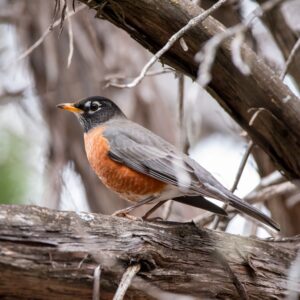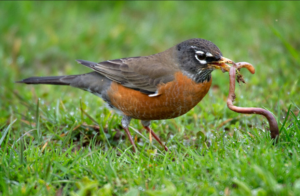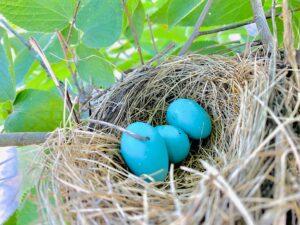 That is why I tell you not to worry about everyday life …..Matthew 6:25
That is why I tell you not to worry about everyday life …..Matthew 6:25
BAM! There he is again. It’s a common sound at our house in early spring. The male robins are making their presence known. It’s a well-known fact that when male birds see their reflection during mating season, they will likely attack the perceived intruder. Now Ken says that the spring-cleaned glass is just a tempting invitation into our living room, but whatever his reason, the robin certainly gets our attention when he bags against the glass. So far, there have been no broken windows, but we’ve seen a few birds walking funny and probably nursing a giant headache.
We’ve always been told that robins go away for the winter and that when they return, we can count on spring being just around the corner. It is true, they are somewhat migratory, but many stay flocked together in nearby wooded areas where they are able to forage for winter’s treasure trove of dried berries and seeds. When the temperature hits the upper thirties, they emerge again, making people think they’ve traveled a long way for a warmer winter season. In truth, they handle the cold quite well and that upper-thirties temperature motivates their favorite food to spring into action. Robins favor earthworms over just about anything in your yard so if your soil supports earthworms, the robins will be there too.
It is true, they are somewhat migratory, but many stay flocked together in nearby wooded areas where they are able to forage for winter’s treasure trove of dried berries and seeds. When the temperature hits the upper thirties, they emerge again, making people think they’ve traveled a long way for a warmer winter season. In truth, they handle the cold quite well and that upper-thirties temperature motivates their favorite food to spring into action. Robins favor earthworms over just about anything in your yard so if your soil supports earthworms, the robins will be there too.
Once the hunt for worms begins, the robin turns its thoughts to nesting and when mates have been chosen, three to five eggs are laid in a nest made of mud, grass, and sticks. They love the long slender dried daylily leaves left in my beds from the previous summer. They nest in very open areas, yet while the trees are still bare, they seem to favor that small, protected area just above our downspouts. We’d much rather they nest in the trees where they belong and our yard has ample trees, so Ken tears down the nests almost daily to keep them from laying eggs there. He doesn’t want to disturb the nest once eggs are laid so he must be persistent to stay ahead of the robins.
 They eventually get the message, head for the trees and we’ll have several nests during the season for each adult pair will raise two or three broods and they don’t re-use a nest. Eggs hatch in fourteen days and the offspring will fledge in another fourteen days, though a little help from mom and dad is still appreciated. The female bird tends the babies while the dad keeps a close watch on the skies for predators who will gladly make a meal of the baby robins and sometimes even the adult birds become prey to a larger bird. The male and female robin will remain monogamous for the summer season and, because robins often return to a successful breeding ground, sometimes they remain together for another summer. They do not, however, mate for life. While some birds may live to a ripe old age, in general, the population of a flock turns over about every six years.
They eventually get the message, head for the trees and we’ll have several nests during the season for each adult pair will raise two or three broods and they don’t re-use a nest. Eggs hatch in fourteen days and the offspring will fledge in another fourteen days, though a little help from mom and dad is still appreciated. The female bird tends the babies while the dad keeps a close watch on the skies for predators who will gladly make a meal of the baby robins and sometimes even the adult birds become prey to a larger bird. The male and female robin will remain monogamous for the summer season and, because robins often return to a successful breeding ground, sometimes they remain together for another summer. They do not, however, mate for life. While some birds may live to a ripe old age, in general, the population of a flock turns over about every six years.
Look at the birds. They don’t plant or harvest or store food in barns, for your heavenly Father feeds them. And aren’t you more valuable to him than they are? Can all your worries add a single moment to your lives? Matthew 6:26
So why all this talk about robins? Well, robins act instinctually and don’t spend their time worrying about “things.” When the earth is warm enough for worms to become active, instinct kicks in and the robins begin their search for food. God has provided berries and seeds for them to survive the cold winter and now he beckons them to the fresh meat that slithers underground. He provides nesting material and new babies to care for as soon as a breath of spring arrives. And the adult robins, well, they just keep doing what robins have always done. So why can’t we take a lesson from them? Why do we continue to worry about everything? Where is our faith in the one who created us in His own image?
warm enough for worms to become active, instinct kicks in and the robins begin their search for food. God has provided berries and seeds for them to survive the cold winter and now he beckons them to the fresh meat that slithers underground. He provides nesting material and new babies to care for as soon as a breath of spring arrives. And the adult robins, well, they just keep doing what robins have always done. So why can’t we take a lesson from them? Why do we continue to worry about everything? Where is our faith in the one who created us in His own image?
Seek the Kingdom of God above all else, and live righteously, and he will give you everything you need.
Matthew 6:33

